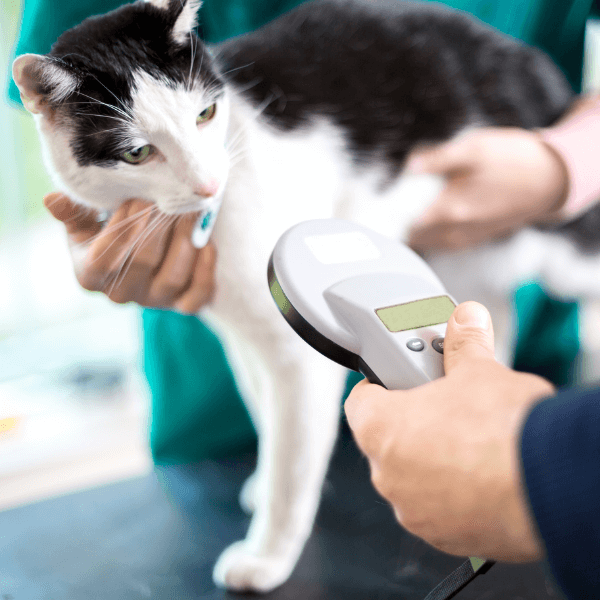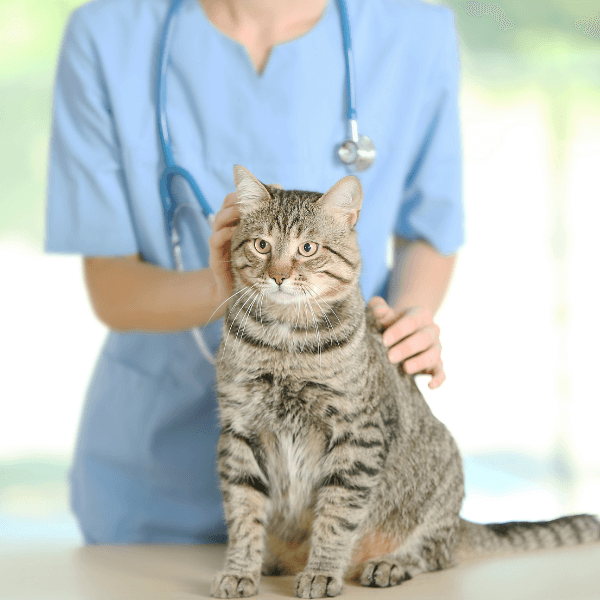Do you have a cat? If so, you may be wondering if microchipping cats is a good idea. Microchipping pets has become increasingly popular in recent years. A pet microchip is a small device that is implanted under the skin of an animal. This chip contains information about the pet, such as name, address, and contact information. If your pet ever gets lost or stolen, this chip can help ensure that he or she is returned to you safely. But before you decide to microchip your cat, it’s important to understand both the pros and cons of doing so.
At Ponderosa Veterinary Clinic, a vet in Colorado Springs, we often get asked about microchipping cats. Our microchipping services are here to keep your pet safe. Each day pets get lost. A cat microchip makes it easier to be reunited with your pet if they ever go missing. Our highly trained veterinarians and veterinary staff are here to help answer any questions you may have about microchipping your cat. Plus, we’re here to provide you and your cat with exceptional vet care if you decide on microchipping your pet.

What is a Pet Microchip?
A pet microchip is a small, rice-sized device that contains a unique identification number. This number is linked to your contact information in a national database. If your pet ever gets lost, a good samaritan or animal shelter can scan the microchip to find out who your cat belongs to and how to reach you. Microchips are implanted under the skin, usually between the shoulder blades. The process is similar to getting a vaccine shot and only takes a few minutes.
How Do Microchips Work in Cats?
When a cat is lost, the first thing you should do is contact your local animal shelters and vet clinics to let them know your cat is missing. You will also want to check their websites and social media pages, as many of them post lost and found pets online. If your cat is found by someone other than yourself or an animal shelter/veterinarian, they will likely take him or her to a local vet or animal shelter to be scanned for a microchip. If your cat has a microchip, the scanner will read the number on the chip and display your contact information so that you can be reunited with your pet.
What is the Purpose of Microchipping a Cat?
The purpose of microchipping a cat is to provide permanent identification in the event that your pet gets lost. A microchip can help ensure that your cat is returned to you if he or she ever ends up in a shelter or with a rescue group. It’s important to remember that a microchip is not a GPS tracker, so it cannot be used to locate your pet if he or she goes missing.
There are many benefits to microchipping your pet, but it’s important to weigh the pros and cons before making a decision. Keep reading to learn more about the pros and cons of microchipping cats.

Pros and Cons of Microchipping Cats
Like anything else, there are both pros and cons to microchipping cats. It’s important to weigh these carefully before making a decision.
Pros:
- A lost pet is more likely to be returned home safely if he or she has a microchip.
- A microchip can provide peace of mind in knowing that your pet can be identified if he or she ever gets lost
- Microchipping is a quick and easy procedure that can be done at your vet’s office.
- There is no battery to worry about, and the microchip will last your pet’s lifetime.
Cons:
- There is a small risk of infection associated with any injection, including the microchip injection.
- Your pet will need to be scanned for the microchip in order for it to be effective, and not all shelters or veterinarians routinely scan for microchips.
- A lost pet is more likely to be returned home safely if he or she has a collar with ID tags.
- If your contact information changes, you will need to update the microchip registry so that it is accurate.
As you can see, there are both pros and cons to microchipping cats. Ultimately, the decision of whether or not to microchip your cat is up to you. When making the decision to microchip your cat it is important to understand both the pros and cons of doing so.
Microchips provide permanent identification for pets in case they are lost, however, not all shelters or veterinarians routinely scan for microchips. Not to mention, if your contact information changes, you will need to update the microchip registry. There is also a small risk of infection associated with any injection, including the microchip injection. Weighing the pros and cons carefully will help you make the best decision for you and your cat.

Safely Microchip Your Cat with Ponderosa Veterinary Clinic
Microchips are a common veterinary procedure. More and more pet owners are considering a pet microchip. However, the pros and cons should still be considered when making the decision for your pet. At Ponderosa Veterinary Clinic, we understand the importance of a microchip. We also understand that every pet owner’s situation is different. Our team can help you weigh the pros and cons of microchipping your cat and answer any questions you may have. We want what’s best for you and your pet. Contact us today to schedule an appointment!




